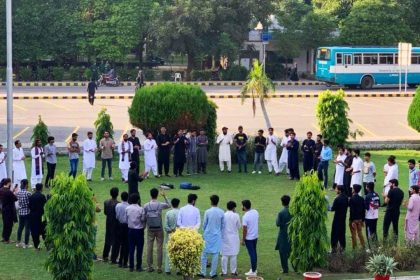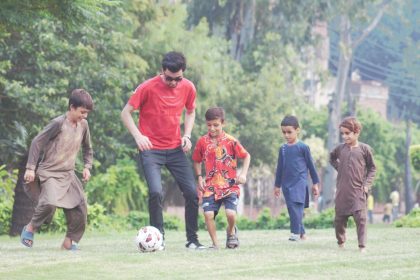Experts, in their exclusive statements, categorize health concerns into four types – physical, mental, emotional, and social well-being. World Mental Health Day is marked every year on October 10 to raise awareness and mobilize efforts to support those experiencing this critical issue.
Anyone can quickly guess how important mental health is for one’s well-being, and taking care of it is solely people’s responsibility. In today’s fast-paced world, mental health concerns are increasing due to excessive pressures from various sources, including demands of social media, stress of workplace, and expectations of loved ones and ourselves.
On the other hand, pressures from family, friends, and community can also contribute to mental health concerns. Biological factors, life experiences, chronic stress, social isolation, substance abuse, physical health problems, poor lifestyle choices, work environment, environmental factors, and genetic predisposition are some other major reasons behind mental health conditions.
Despite its major impacts on lives, mental health issues are often overlooked or undervalued. Many people feel a need to present ourselves as if nothing is wrong, which can lead to chronic cases. However, it is important to diagnose mental health issues as disorders and seek help from a specialist to live a well-balanced and fulfilling life.
Experts suggested confronting misrepresentations of mental health by first defining good mental health. It could be characterized by several key factors, like a desire to excel in all spheres of life, to accept and love oneself, to contribute positively to the advancement of society, and to possess the resilience to manage day-to-day stressors. It is innate and essential for one’s health and productivity.
Clinical psychologist and public speaker Mahnoor Khan, who is generally considered one of the most vocal and progressive members of the young psychologists and most followed on Instagram, shared her views with Jarida Today on this sensitive topic. She emphasized being very clear when investing in people and relationships because not everyone who comes into your life deserves your 100 percent. She said that giving too much can exhaust you and badly damage your mental health.
She said that an active connection with the past creates a bridge between current problems and past issues, leading to anxiety, stress, and depression. “These [issues] can stem from not letting go of past events, which may result in psychological mental health issues.” Mahnoor Khan explained that the reason for this discrepancy was a lack of awareness, as many do not even view mental health as a form of well-being.
She regretted that neither employers nor educational institutions provided paid mental health leave, unlike in developed countries. She said sick leave might cover both physical and mental health, but when people write down their reason for being ill, they are often reluctant to mention that the illness was caused by a mental disturbance due to the fear of acceptance and unsolicited questions and advice.
Additionally, nonverbal communication plays a significant role in this situation, as many people avoid sharing their mental health struggles with others, she added. Prolonged use of social networking sites has been linked to symptoms of depression, according to several studies. Some authors have suggested that certain social media practices, particularly among children and adolescents, may be linked to low self-esteem.
Users of these platforms are under so much pressure to meet unrealistic expectations – of intelligence, beauty, lifestyle, relationships, and more – that they find themselves unintentionally engaged in unhealthy competition. They strived to meet these seemingly impossible standards of luxury living. But who knows what goes on behind closed doors?
In 2019, one in every eight people, or 970 million people around the world, were living with a mental disorder, with anxiety and depressive disorders being the most common. Human negligence negatively impacts mental well-being by prolonging stigma, overlooking initial signs of mental illness, and failing to seek adequate support or help from a good listener.
When societies keep neglecting mental health issues, it may result in severe and worsened cases, leaving the affected person feeling isolated and alone. In addition to that, insufficient funding for mental health resources, awareness campaigns, or support groups hinders proper treatment and recovery. Only collective efforts can address this fundamental aspect of one’s life.
Mental health disorders are prevalent in Pakistan, often overlapping with physical complaints. Drug addiction is often seen as a solution for stress or depression. Emotional and mental well-being issues increase suicide rates, especially among adolescents. However, adolescents receive less sympathy, and research on mental disorders is limited nationally.
Being a good listener can heal a heart, a person, a soul, and a mind. As the saying goes, “A stitch in time saves nine.” So, offer emotional, practical, and professional support. Emotionally, you can listen actively, show empathy, and be patient throughout the journey. Practically, helping with daily tasks encourages a healthy routine and motivates one to establish a healthy lifestyle.
Professionally, if the first two strategies do not work, encourage seeking help from a professional who can provide information about treatment and align appointments. Mental health concerns are alarmingly widespread in Pakistan. According to the World Health Organization, an estimated 45.5 million people suffer from mental disorders, with depression, anxiety, and schizophrenia being the most common.
In conclusion, mental health plays a crucial role in overall well-being, demanding more attention and care from individuals and society.
We must develop a culture where we foster understanding and proactive engagement to discuss this topic openly and help each other cope with it. Collective efforts will result in healthier, more resilient communities where everyone has the security and assurance to thrive emotionally and mentally.










